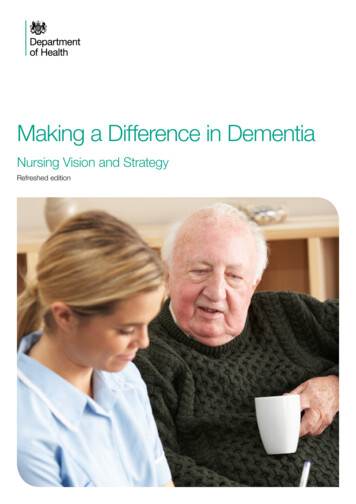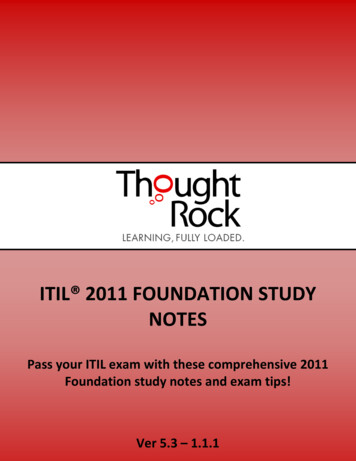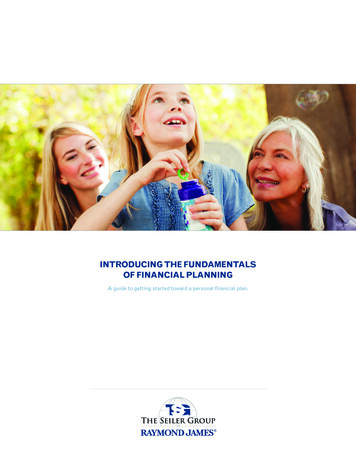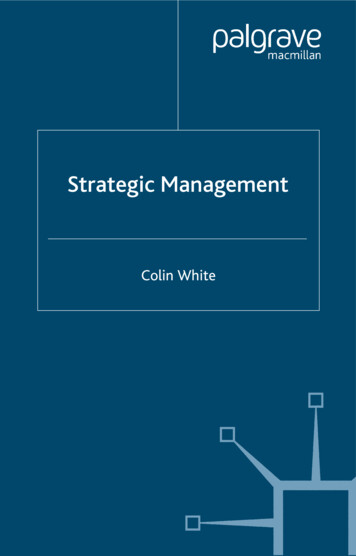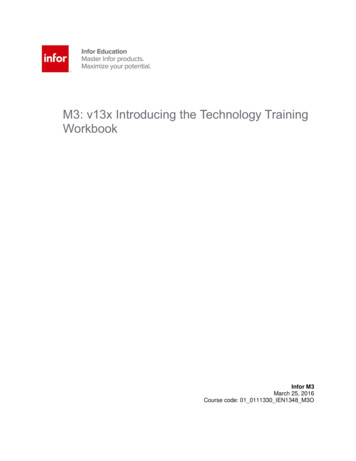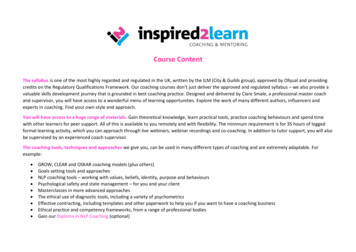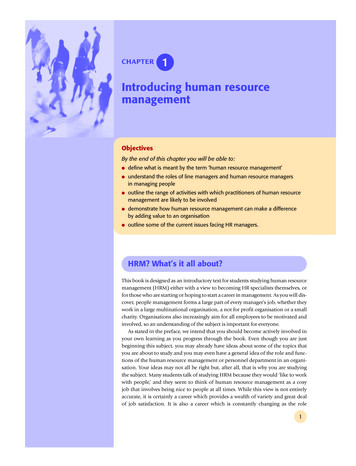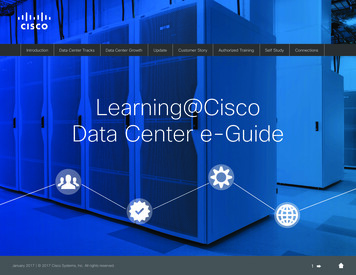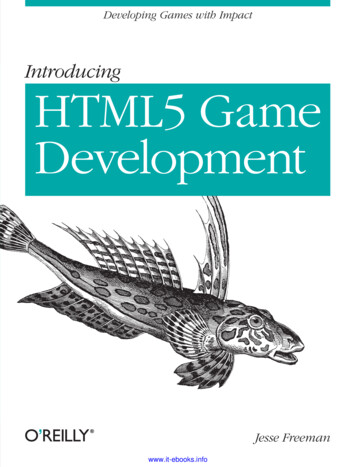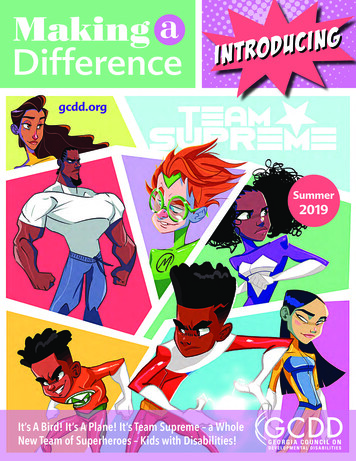
Transcription
s A Bird! It’s A Plane! It’s Team Supreme – a WholeNew Team of Superheroes – Kids with Disabilities!SUMMER 20181
MakingDifferenceA quarterly digital magazine from GCDDVOLUME 20, ISSUE 1The Georgia Council on Developmental Disabilities (GCDD) is driven by its Five Year Plan (2017-2021)goals of education; employment; self-advocacy; Real Communities; and formal and informal supports.The Council, charged with creating systems change for individuals with developmental disabilities andfamily members, will work through various advocacy and capacity building activities to build a moreinterdependent, self-sufficient, and integrated and included disability community across Georgia.Register! Educate! Vote!Use Your Power! Making theDisability Vote Countby Hanna RosenfeldOut of the approximately 10.5 million peoplethat call our state home, only about 6.9 millionare registered to vote. Which means there arearound 3.5 million Georgians going about theirdaily lives, unregistered to vote. That means wehave a lot of work to do.It’s A Bird! It’s A Plane!It’s Team Supreme!by Jennifer Bosk and Devika Rao10Meet Team Supreme, kids with disabilities whohave superpowers, allowing them to make theworld a better place. Atlanta-based artist, JoshuaLeonard, set out to create superheroes whichincluded boys and girls with all skin tones andall types of abilities and disabilities.Atlanta’s Own Caped Crusaderby Jennifer Bosk13Donning a supersuit, cape, gloves and mask,Betsy Goodrich of Lilburn, GA embraces heralter-ego, “Danger Woman,” who has becomeAtlanta’s very own superhero fighting fordisability civil rights.Eric E. Jacobson, Executive Director, eric.jacobson@gcdd.ga.gov2 Peachtree Street NW, Suite 26-246, Atlanta, GA 30303-3142Voice 404.657.2126, Fax 404.657.2132, Toll Free 1.888.275.4233TDD 404.657.2133, info@gcdd.org, www.gcdd.orgO’Neill Communications, Design & LayoutDevika Rao, devika@oneillcommunications.comSUMMER2019Making a Difference magazine is available online at gcdd.org in: English, Spanish,Audio and Large Print. Previous Issues are archived on the website as well.2MAKING A DIFFERENCE MAGAZINEVIEWPOINTLiving MoreMeaningful Livesby Eric E. Jacobson.3AROUND THE STATEMiracle Field HitsHome Run on InclusiveBaseball Experienceby Tim Orff. 4WHAT’S HAPPENING INWASHINGTON?by Alison Barkoff .14REAL COMMUNITIESWelcoming CommunityDialoguesby Jennifer Bosk . 16GCDD IMPACTMedicaid Advocacy Educatesand Empowers Georgianswith Disabilitiesby Jennifer Bosk . 18GCDD STORY COLLECTIONQueen Beeby Moira Bucciarelli . 20EXPERT UPDATEImproving Student Outcomesby Zelphine SmithDixon, Ed.D.22COMMUNITY CALENDARJuly – October . 24On the Cover: Team Supreme, a teamof superheroes made up of kids withdisabilities and their adoptive dad, usetheir collective power and gifts to makethe world a better place and promoteacceptance, inclusion and self-love.DEPARTMENTSFEATURESPUBLIC POLICY FOR THE PEOPLE6SUMMER 2019
GCDDEric E. JacobsonLIVING MORE MEANINGFUL LIVESThis year marks the 20th anniversary of the Olmsteaddecision, which mandated that people with intellectualand developmental disabilities (I/DD) should live in thecommunity and not state-run institutions. This decisionbegan in Georgia when Lois Curtis and Elaine Wilsondecided they did not want to live in the state hospitaland asked to move to the community.Because of this decision, peopleacross the country have beenfreed from institutional livingand now live more meaningfullives. However, in Georgia,over 200 people still reside inGracewood State Hospital inAugusta, and thousands morereside in nursing facilities.While many believe it is timeto end Department of Justiceoversight of the closure of stateinstitutions, GCDD believes thatoversight cannot be completed untileveryone is moved out. We believethe Department of BehavioralHealth and DevelopmentalDisabilities (DBHDD) wantsto do the right thing. However,systemic pressures will keepGracewood open, and thoseremaining there will live out theirlives in isolation and segregation.It is time we end this and makethe commitment to move theremaining people from Gracewoodback into their communities.One way we can assure people withI/DD are living in the communityis by electing people who arecommitted to improving the livesof people with I/DD. In thisedition of Making a Difference, weexplore the many activities goingon to get people registered to vote.If you don’t like what is happening,register to vote, meet with thoserunning for local, state and nationaloffice and then cast your vote. AsJustin Dart said, “Vote like yourlife depends on it, because it does.”Read more about voting in our“Public Policy for the People” feature.We also cover a new, collaborativecommunity-engagement effortmanaged by GCDD: WelcomingCommunity Dialogue groups.Together with Global Ubuntu,GCDD is working to supportcommunity dialogues onsocial issues and/or themes incommunities throughout thestate of Georgia. The aim ofthe dialogues is to create spacefor community members ofdiffering backgrounds, races andabilities to discuss and dreamof a society where everyone istreated with dignity and justice.Creating a welcoming communityis a journey that a community cantake together; it is not a projectand doesn’t have to be hard.Conversations can start over coffeeor dinner simply by asking how wecan create a fair and welcomingcommunity for all. GCDD andGlobal Ubuntu are working witha group of community buildersaround the state of Georgia byVIEWPOINTproviding financing, facilitationand mentoring in support of theirefforts to assist in the creationof welcoming communitiesand neighbors. Read our articleto learn more about WelcomingCommunity Dialogue groups.ONE WAY WE CAN ASSURE PEOPLEWITH I/DD ARE LIVING IN THECOMMUNITY IS BY ELECTINGPEOPLE WHO ARE COMMITTED TOIMPROVING THE LIVES OFPEOPLE WITH I/DD.Check out GCDD’s website andjoin our advocacy network to stayinformed. We hope you enjoyreading this magazine, and wewant to hear from you. Let usknow your thoughts by writing toManaging Editor, Hillary Hibben,at hillary.hibben@gcdd.ga.gov.Eric E. JacobsonExecutive Director, GCDDTell us your thoughts about the magazine or what topics you would like to see addressedby emailing us at hillary.hibben@gcdd.ga.gov, subject line: Letter to the Managing EditorSUMMER 20193
THE STATEAROUNDVALDOSTAWith the help of many in thecommunity, Gibbs began the localMiracle League chapter so thosewith disabilities could play andenjoy baseball with no obstacles.To achieve that, a Miracle Field,which is a two-dimensional,rubberized, accessible baseball field,would have to be built.Gibb’s determination to create thatfield led to forming a board thatincluded members of the MiracleLeague and Valdosta-LowndesCounty Parks and RecreationAuthority (VLPRA). Within sixmonths, they were able to raise over 1.7 million.With the VLPRA’s help, themoney created the Miracle LeagueComplex at Freedom Park, aMiracle Field Hits Home Run onInclusive Baseball Experienceby Tim OrffIn the Valdosta-Lowndes County area, there were few options forthe 5,000 kids with disabilities to engage in physical activity. In2004, after doing research on the issue, current city councilmanand former Valdosta State football player Andy Gibbs saw aneed and founded the Miracle League of Valdosta (MLV).14-acre, state-of-the-art complex,which opened in March 2019 andis home to the nation’s largestMiracle Field.When people think ofMiracle League of Valdosta,we want them to think abouthow to include everyone,provide an opportunityto feel special and to say,‘People DO care about me.’In addition to baseball, this fieldalso includes four 50-meter racelanes for track and has space toplay soccer and basketball. “[We]wanted to give kids all the optionsthey could to play as many sportsas possible,” said Gibbs, who isalso MLV’s league director. “It’sour goal to always provide a placewhere [Valdosta’s] kids and adultshave somewhere to be and [are]welcomed,” he added.During the MLV season, whichlasts for six weeks, athletes oneach team learn the fundamentalsof baseball and are given thesame fanfare as Major LeagueBaseball (MLB) players withtheir own “walk-up” music, nameannouncement and replicaMLB jerseys and hats. Additionally,MLV utilizes a “buddy system,”which pairs each player with a peerwithout disabilities.Miracle Field in Valdosta, GA4MAKING A DIFFERENCE
More than just playing a game,Gibbs also believes that MLV isabout making new friends,building self-esteem and beingtreated just like other athleteswithout disabilities.“Parents come up to us and say,‘you don’t understand what thishas done for my family’ and wefeel blessed being able to take whatGod has given us to serve others,”Gibbs said.The first season played on MiracleField took place from March toApril 2019 and included 114 kidsand adults with disabilities andover 350 volunteers.Gibbs attributes the success of theMiracle League Complex to “whathappens when a county and citycome together to meet the needsof its kids,” and is also proud ofhow the entire community createda standard of inclusion.He stated, “When people think of[MLV], we want them to thinkabout how to include everyone,provide an opportunity to feelspecial and to say, ‘People DO careabout me.’”Serving Valdosta-Lowndes Countyand the surrounding area, theMiracle League Complex alsoincludes four additional regulationbaseball fields, a wheelchairaccessible pavilion that can hold180 people, a tiered amphitheaterand a fully accessible playground,which are open to all visitors.The next MLV season kicksoff in September and lasts untilHalloween, and future plans forthe complex include movie nights,a “Parents Night Out,” a kickballleague and more.To sign up for the upcomingMiracle League of Valdosta seasonand to volunteer, contact AndyGibbs at valdostamiracles@yahoo.com or 229.563.8877 or visit theMLV Facebook page.The Miracle League offers opportunities for childrenwith mental and/or physical challenges to play baseball. Theorganization designs and constructs custom baseball fields thathave a rubberized turf to prevent injuries, wheelchair-accessibledugouts and a completely flat surface to eliminate barriers towheelchair-bound or visually-impaired children. The MiracleLeague gives more than 200,000 children and young adultswith disabilities across the US, Canada, Mexico and Australia theopportunity to enjoy America’s favorite pastime.SUMMER 20195
PUBLIC POLICY FOR THE PEOPLERegister! Educate! Vote!Use Your Power! Makingthe Disability Vote Countby Hanna Rosenfeld, GCDD Planning & Policy Development SpecialistOnly 65.9% of Georgians are registered to vote.Out of the approximately 10.5 million people that call our statehome, only about 6.9 million are registered to vote. Which meansthere are around 3.5 million Georgians going about their dailylives, unregistered to vote. Abysmal if you ask me. While someof the 3.5 million are ineligible to vote due to age, legal status,residency status or past convictions, quite a number are eligible tovote in our state. That means we have a lot of work to do.Undoubtedly, voting is the bedrockof our society. While we coulddebate the merits of requiring votersto pre-register, the reality is thatin order to vote in Georgia, youmust be registered to vote.Registering to vote is the very firsthurdle each of us must face when itcomes to voting. There are a varietyof reasons people don’t end upvoting on election day, from lack ofchildcare to lack of transportation,but don’t let registration be thebarrier stopping you from voting.Chances are you know one ofthose 3.5 million Georgians whoare not registered to vote. Makea point of asking your friendsand family if they are registered.With National Disability VoterRegistration Week occurring fromJuly 15 to 19, the time to register is6now. Chances are you know one ofthose 3.5 million Georgians whoare not registered to vote. Make apoint of asking your friends andfamily if they are registered to vote.It is so easy to do. All you have todo is visit the Georgia Secretary ofState’s “My Voter Page” website.Even if you think you areregistered, it is always a goodidea to double check well inadvance of election day. In theprocess of writing this article,I discovered I was no longerregistered to vote. Because I hadrecently moved to a differentcounty, I needed to update myvoter registration. Let this be areminder that anyone, includingthe person charged with writingan article about voting inGeorgia, can forget to changetheir address. Even if you thinkyou are registered to vote, makea point of double checking thateverything is good to go.MAKING A DIFFERENCE MAGAZINEOnce you are registered, the nextcrucial step occurs when youactually cast your ballot. For someof us, that can be rather tricky.We might have to ensure we havesuitable identification or findaccessible transportationGCDD’S PUBLICto reach our pollingPOLICY TEAMlocation. Sometimesthe hurdles to vote canfeel overwhelming. It isimperative that we eachkeep working to ensureeach and every eligiblevoter is registered andcasts their ballot onelection day.Casting your ballot isDAWN ALFORD, GCDDessential. Registering toPublic Policy Directorvote is no good unlessyou cast your ballot for acandidate. If we want ourleaders to pay attention tous, they must know thatthe disability communityis a community of voters.Some of us may nothave deep pockets tomake large campaigncontributions, but we allHANNA ROSENFELD,have the ability to castGCDD Planning anda ballot. True, moneyPolicy DevelopmentSpecialistoften means power.However, when we allband together to cast our ballots, weamplify our power and impact.
While we may not be electing anew US president any time soon, agreat number of local elections willbe occurring across our state in thecoming year. In some ways, localelections are even more importantbecause your ability to impact theresult is magnified. Point of fact,the very first election I voted in wasdecided by only 90 votes. Out of theover 40,000 people that cast theirballots that day, it was 90 peoplewho really made the difference.Some people think that just onevote has no value. They are wrong.Polling and predictions only get youso far. Until the votes roll in, thereis no foolproof way to know whatthe margin of victory or defeat willbe. Ninety votes were all it took thatday in Cobb County. Will you bethe next 90? I sure hope so.Let us be clear. I don’t care who youvote for. The Georgia Council onDevelopmental Disabilities doesnot care who you vote for. We justcare that you vote. Disability activistJustin Dart once said, “Vote as ifyour life depends on it, because itdoes.” As members of the disabilitycommunity, we should all be acutelyaware of the impact governmenthas on our lives. From Medicaidto Social Security, governmentprograms are often a key part ofattaining a life well lived in thecommunity. We have no excusefor failing to vote in everyelection we are qualified tovote in. If we don’t vote, then wehave no control over the decisionsour leaders might make and howthat might impact our very lives.No candidate or political party hasthe market cornered on disabilityissues. In many cases, candidatesdon’t even have a stance on issuesimportant to our community. Ifwe start showing up to vote inlarge numbers, you bet your bootscandidates will start learning aboutour community and the issues wecare about. And if no candidatespeaks your truth, consider runningfor office yourself – local offices likecity council, school board, countycommissioner or even the StateHouse are incredibly achievable.If running for office is somethingthat appeals to you, be sure tocheck out the National Councilon Independent Living’s recentlyarchived series of webinars,“Elevate: Campaign Training forPeople with Disabilities.”What’s Happeningin GeorgiaWhile it’s off season, manyindividuals are announcingtheir candidacies for the 2020election from city councils tostate legislators to commissioners.Also, the Georgia House ofRepresentatives and GeorgiaCASTING YOUR BALLOT IS ESSENTIAL.REGISTERING TO VOTE IS NO GOODUNLESS YOU CAST YOURBALLOT FOR A CANDIDATE.State Senate will hold elections,including federal seats forthe US Senate and House ofRepresentatives in 2020. TheAtlanta Journal-Constitutionprovided a latest update on who isseeking office next year, with manymore to be added to the ticket.To know who might be running foryour district, city council, schoolboard or other local, state andfederal offices, engage with yourlocal newspapers or news stationsor resources like Open States orBallotpedia.SENATESEATSHOUSESEATSUS CONGRESS:468 SEATS UPFOR ELECTIONIN 2020SUMMER 20197
PUBLIC POLICY FOR THE PEOPLEVoting SystemChanges in GeorgiaRecently, Governor Kemp signedHouse Bill 316 into law. Passed bya 101 yea/69 nay in the House and35 yea/1 nay in the Senate, HB 316makes changes to Georgia’s voterregistration and voting system.Undoubtedly, the most notablechange for most voters will beGeorgia’s new in-person votingmachines. While there is still agreat deal that must be decided,HB 316 calls for Georgia to adoptnew voting machines.AS MEMBERS OF THE DISABILITYCOMMUNITY, WE SHOULD ALL BEACUTELY AWARE OF THE IMPACTGOVERNMENT HASON OUR LIVES.Many of you will be familiar withthe electronic touch screen votingmachines we have had for thepast two decades. HB 316 callsfor the adoption of electronicballot markers, defined as “anelectronic device that does notcompute or retain votes; mayintegrate components such asa ballot scanner, printer, touchscreen monitor, audio outputand a navigational keypad; anduses electronic technology toindependently and privately marka paper ballot at the direction of anelector, interpret ballot selections,communicate such interpretationfor elector verification and print anelector verifiable paper ballot.”whereby after selecting your vote,you receive a printed receipt. In thepast, you simply clicked submit andhanded back the electronic card.Still, there is a lot we do not knowat this time. Georgia’s Secretaryof State, Brad Raffensperger, hasissued an RFP (i.e., request forproposals) to solicit applicationsfrom six companies to supplyGeorgia with our new system. Untilthe company is selected, we won’ttruly know what our new systemwill look like.Moreover, the process by whichregistered voters are removed fromthe voter rolls has been updated,likely for the better. While in thepast a voter was removed afterthree years of inactivity, voterswill now be removed afterfive years of inactivity. Thisis significant because there area great deal of misguided votersin Georgia that only vote inthe presidential election. Sincepresidential elections come aroundevery four years, such voters in thepast may have found themselvesremoved from the voter registrationrolls. Of note, inactivity is definedas failing to file an updated voterregistration card, failing to filea change of name or address,not signing a petition which isrequired by law to be verified bythe election superintendent orSecretary of State, not signing avoter certificate, failing to apply orvote absentee and failing to confirma continuation of address notice.To the voter, the most obviouschange will be the final step8MAKING A DIFFERENCE MAGAZINEAnother key change is thereduction of voting machines perperson. Previously, one machinewas required for every 200 voters.HB 316 has changed this to onemachine for every 250 voters.This is significant, as this couldlead to longer lines at the polls.Only time will tell if the newmachines move people throughfast enough to accommodate thereduction of machines.Additionally, restrictions for closingor changing polling locations havebeen implemented. Indeed, within60 days of a general primary,general election or generalelection runoff, no changesmay be made to a pollinglocation. In the case of a specialprimary, special election or specialelection runoff, HB 316 restrictschanges up to 30 days in advance ofthe election.Importantly, the requirementthat all polling locations beaccessible to voters withdisabilities has not changed inany way. Still, we know thatthere exist polling locations inGeorgia that are not accessible.Should any of us encountera polling location that is notaccessible, it is our duty toreport that location to yourlocal board of elections, to theSecretary of State’s Office andto the GeorgiaAdvocacyOffice.HB 316 REQUIRES 1 MACHINEFOR EVERY 250 VOTERS.PREVIOUSLY, ONE MACHINE WASREQUIRED FOR EVERY 200 VOTERS.
UPCOMINGEVENTSPUBLIC POLICYCALENDAR:JULY 15 - 19, 2019 ISNATIONAL DISABILITYVOTER REGISTRATION WEEKWHAT YOU CAN DO TO CELEBRATE:4 July 15-19, 2019:National Disability VoterRegistration Week4 October 2019: Take YourLegislator to Work Day4 January 13, 2020:First Day of the 2020Legislative Session4 2020 Advocacy Days:January 29, February 11,February 20, February 27,March 11 REGISTER TO VOTE. CHECK YOUR REGISTRATION STATUS. ASK 10 FRIENDS TO REGISTER TO VOTE. MAKE SURE YOUR POLLING LOCATION ISACCESSIBLE. FIND OUT WHO IS RUNNING FOR OFFICEin your district, city council, school board orother local, state and federal positions. CONSIDER RUNNING FOR OFFICE. CAST YOUR BALLOT ON ELECTION DAY!SPECIAL ELECTION:ATLANTA PUBLIC SCHOOLS –SCHOOL BOARD4 September 17, 2019:Election Day4 October 15, 2019: RunoffResources for What’s Happening in Washington? Money Follows the Person and advocacy around the EMPOWER Care Act Status of the proposed Disability Integration Act (DIA) Status of implementation in Georgia of the Home and CommunityBased Services (HCBS) Settings Rule Texas v. U.S. and other attacks on the Affordable Care Act (ACA) Proposed Rollback of Nondiscrimination Protections under the ACA’sSection 1557JOIN THE FIGHT TO PROTECT MEDICAID!SUMMER 20199
It’s A Bird! It’s A Plane!It’s Team Supreme!by Jennifer Bosk& Devikain collab Raoorationwith TimOrffWhile Superman is busy fighting for truth and justice andBatman once again faces the Joker, there’s a whole new teamof superheroes who are taking the universe by storm. Meet TeamSupreme, a troupe of kids with disabilities who have superpowers,allowing them to make the world a better place.can show them via a creative way ofteaching, they’ll understand better,”Leonard adds, who was trainedat the Art Institute of Atlanta inmedia arts and animation.And he hopes Team Supreme doesjust that.Team Supreme includes:lZeek, 11 years old with autism,his super-human brain powerdespite his debilitating depression.His mission is for greatnessdelivered through his children.Sweet Pea, 8, Zeek’s sisterThe Journey toTeam Supremewho uses his extreme memoryand intellect to solve puzzles;lwho is diagnosed with sicklecell. Her superpower is herloving and giving heart;lMech, 12, diagnosed withspina bifida and incredible withhis hands, allowing him to buildgadgets and code computersystems;llLi, 12, is blind and uses herenhanced senses of hearingand smell that allow her to findpeople and places; andThumper, 7, is deaf, andhis superpower allows him tosee through sound and haveenhanced peripheral vision.The team is led by Dr. Jackson,their adoptive father who utilizes10Developed and created by Atlantabased artist and animator, JoshuaLeonard, 35, Team Supremebecame an answer to a problemin mainstream media. Growingup, every time Leonard saw asuperhero in the media, it was the,“same old, big, guy with muscles. Iwas so tired of them all looking thesame,” Leonard explains.So, he set out to create superheroesfor his team which included boysand girls with all skin tones andwith all types of abilities anddisabilities. “I believe we needmore representation of people withdisabilities in the arts to teachpeople that different is good. If IMAKING A DIFFERENCE MAGAZINE“I want this to reach the masses andteach the masses. The goal is to notonly show these specific charactersin the light, but also to make a fun,cool type of cartoon that everyonewill love,” Leonard explains.He has worked at Home Depot forthe past 14 years, and it was therehe met a co-worker who has a sonon the autism spectrum.“He is so smart,” Leonard says.“He knows the definitions ofeverything, can talk numbers, sports anything.” The son became theinspiration for Team Supreme’s Zeek.He dove more deeply into his artto help him cope when his bestfriend was murdered in 2008. TeamSupreme’s Dr. Jackson is based onthis friend.I believewe needmorerepresentation ofpeoplewith disabilities intarts to teach peop hele thatdifferentis good.
The Bigger PictureSome mainstream superheroesare individuals with disabilities:Marvel’s Daredevil, attorney MattMurdock, blinded in a childhoodaccident, uses his heightened radarsense to fight crime; Hawkeye,who became deaf saving all ofNew York’s superheroes, useshis enhanced marksmanshipand intellect as a member of theAvengers; and Professor CharlesXavier, (Professor X), a geneticistwho uses a wheelchair and leads theX-Men, just to name a few.But representation of people withdisabilities in the media overall isgrowing glacially. A March 2019report by The Ford Foundationcalled the “Road Map for Inclusion:Changing The Face of DisabilityIn Media” detailed how few peoplewith disabilities are seen in moviesand on TV.The report cites GLAAD’sWhere We Are on TV ’18-’19report that states:“Only 2.1% of primetime broadcastTV series regulars – or a total of16 characters – have disabilities. Arecent Annenberg study found that,across the 100 top-grossing movies of2016, only 2.7% of characters weredepicted with a disability, only 2.5%of characters were depicted with adisability over the past 10 years, andnearly half of the films across the top100 did not include a single characterwith a disability.”While progress is slow, there aresmall positive changes to the mediaFollow along on TeamSupreme’s and Leonard’sadventures on his LeonardStudios website and seethese stories evolve.landscape. A newcrop of shows likeABC’s “Speechless”(now canceled) orNetflix’s “Special”are not only focusing on positive,everyday lives of people withdisabilities, but also casting peoplewith disabilities to play the part.At the time of this writing, CBSEntertainment released newspledging its role to improvedisability inclusion in Hollywood,according to an exclusive report byThe Hollywood Reporter.According to the article, thecompany pledged to “auditionactors with disabilities for each newproduction going forward. CBSwill now do so for each of its newprojects that gets a series.”The pledge came on the heelsof a report by the RudermanFamily Foundation that stated, “55million Americans (about 20% ofthe population) have disabilities,but fewer than 2% of televisioncharacters do. And of thosecharacters, 95% are played by ablebodied actors.”The network became the firststudio in the industry to make thispledge to increase representation ofpeople with disabilities on its showsthrough its audition processes.The Power of GiftsIt is important to add that TeamSupreme is not depictingpeople withdisabilities to be superheroes intheir everyday life. In other words,it is not pushing the trope or clichéthat by doing everyday things likegoing to work or school, spendingtime with family and friends is byany means “extraordinary.”DISABILITY INCLUSION IN MEDIA20%of populationhave disabilities% 2of TV charactershave disabilitiesTeam Supreme adds to the genreabout everyday people who livewith secret superpowers or talentand gifts to do good in theircommunities and around the world– like Peter Parker’s Spidermanwho has the spider-like abilityto cast webs and helps to fightscrime in New York; or MayaLopez’s Echo, one of the very fewdeaf superheroes, who usesher talents of photographicreflexes and memory tofight evil alongsideDaredevil, theAvengers and NewAvengers.LiZeekSweetPeaGeneral PopulationDr.JacksonMechThumperSUMMER 201911
Leonard envisions that TeamSupreme will use its collectivepower and gifts to make theworld a better place by fightingbullying and other issues thatall people struggle with today,including children with disabilities.The team of superheroes wouldpromote a world of acceptance,inclusion and self-love.ions thatsivnedrLeonaill use itswemerpsTeam Sur and giftewopevcollectithe worldto makelace.a better pThe Supreme ImpactAs Leonard continues to create anddraw Team Supreme’s superheroes,he consults with other friendsand medical professionals aboutdisabilities and medical differencesto incorporate into his characters.He did a lot of research to getthe information he shares, via thesuperheroes, correct.He is also currently developinga grade school curriculum, basedon Team Supreme, to help teach12children about diversity andinclusion. Using short, animatedfilms about the pint-sizedsuperheroes, Leonard also hopesto explain the importance of aninclusive community.He shares his art knowledge andskills by speaking to studentspursuing arts education. Mostrecently, he led a character designworkshop for students at KennesawState University and taught ananimation and character designlesson to students at CumberlandAcademy of Georgia: AutismSchool Atlanta.“The best part of all of this is thekids’ reactions,” says Leonard.He shares about a young boynamed Jaiden with autism. Hismother, Shekira, made him a TeamSupreme “Zeek” costume and whenJaiden puts it on, he becomes moreoutgoing and more confident, evendancing in crowds.And there are plans for TeamSupreme to grow. There arenumerous other characterson the team and Leonardintends to add individuals withDown syndrome and otherintellectual, developmentaland medical differences.His plan is for Team Supreme tohit the big time – possibly Netflix,MAKING A DIFFERENCE MAGAZINEI want kids to seethemselves in thesecharacters and to believein themselves.Disney or another streamingservice – within the next two years.Leonard is working with EmmyAward-winning writer, creator andactress Lena
Atlanta's Own Caped Crusader. by Jennifer Bosk . Donning a supersuit, cape, gloves and mask, Betsy Goodrich of Lilburn, GA embraces her . alter-ego, "Danger Woman," who has become Atlanta's very own superhero fighting for disability civil rights. Making. Difference. A quarterly digital magazine from GCDD


